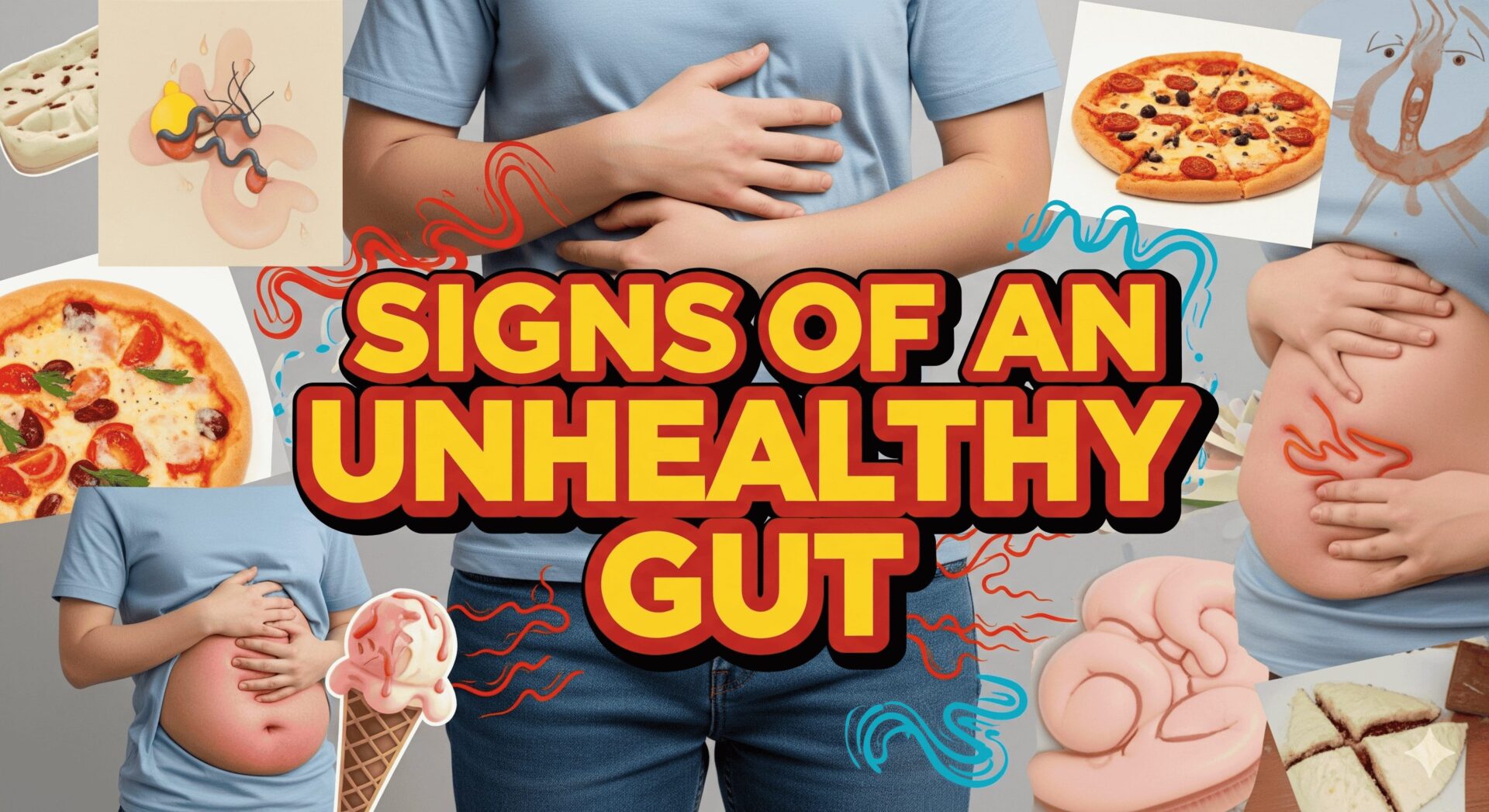Introduction
In Today’s world unhealthy gut is one of the main problems. These problems arise due to a lot of sweet and processed food included in the diet. It lacks fiber in our diet. But each day, some habits can mess up this balance. When this happens, it hurts your gut health and your overall health.

The signs can be things like chronic fatigue or even skin issues. If you do not pay attention, these problems might get worse. It is important for people to spot these early signs. This helps you fix things and keep a healthy microbiome.
If you want to read other blog about Benefits of Coconut Water in Pregnancy: Myths vs Facts
Signs of an Unhealthy Gut You Shouldn’t Ignore
The way your gut microbiome works is important for your health. If you have poor gut health, it can cause many problems.
These problems can show up in your digestion, your body’s ability to fight sickness, and even your mood. You may notice some digestive symptoms, like bloating or heartburn.
You could also see changes in your weight that you can’t explain. Some people feel tired or notice mood swings, which could also be signs of unhealthy gut.
It is important to spot these changes early. Otherwise we make a big problem in future. Here are ten signs that may show your gut microbiome is not working well.
1. Persistent Digestive Issues (Bloating, Gas, Diarrhoea or Constipation)
Frequent digestive discomfort, like bloating, gas, diarrhea, or constipation, may show that the gut microbiome is not balanced.
A healthy gut Bacteria have wide range of good bacteria present to keep digestive health. If this balance is off, harmful bacteria can grow, and that can bring on several gastrointestinal symptoms. These symptoms affect how people feel and their health overall.
These stomach problems that happen often can keep the body from getting enough nutrients. They can also make inflammation worse, and this will impact mood and energy levels.
Noticing these signs early allows you to work on your gut health. A focus on a healthy gut can help bring back balance and improve how you feel every day, giving your body more vitality.
2. Unexpected Weight Fluctuations
Changes in your weight, either gaining or losing, can happen because of issues with your gut bacteria. When there is not enough different types of gut bacteria, it can be hard for your body to control blood sugar and store fat the right way.
If there is a lot of bad bacteria, it can cause inflammation. This can make you gain weight. In other cases, if there is too much bacterial overgrowth, your body may not take in nutrients well, and this can lead to weight loss.
Having the right balance of gut microbiota is important for keeping your weight and blood sugar under control.
For example, SIBO can make you lose weight without trying. On the other hand, when your gut is upset and you get insulin resistance, you often see weight gain. To get things back in balance, it helps to look at what you eat and add more foods with fibre.
If you still see changes, testing your gut microbiome and other health signs can help you understand why.
3. Frequent Sugar Cravings
Constant cravings for sugary foods may show that there is a problem in the gut microbiome. The gut bacteria need balance to work well.
But when you eat high amounts of sugar, it can cause bacterial overgrowth. They also make the urge for more sugary foods stronger. This can turn into a cycle that is hard to break.
Over time, added sugar in the food you eat can make inflammation worse in your body. This can also hurt the way your gut works.

If you want a healthy gut, try to swap out processed and refined sugar. Instead, add more fiber-rich foods to your meals. This can help your gut feel good and keep cravings under control.
Changing what you eat by adding more whole grains, lean proteins, and natural foods like fruits can help the gut microbiome.
If you often feel like eating sugar, this can mean there is a bigger problem. It is good to fix this early so your digestive health can be better for a long time.
4. Chronic Fatigue and Poor Sleep Quality
Feeling tired even after getting enough hours of sleep may mean you have an unhealthy gut. Changes in your gut bacteria can lead to broken sleep and bad sleep quality.
This can make your energy drop a lot. A poor gut health can also bring on problems, like inflammation and changes in your hormones. These things can all lead to chronic fatigue.
An unbalanced gut microbiome can change how much serotonin your body makes. Serotonin is a chemical that is important for good sleep and relaxe mood.
If you do not have enough beneficial bacteria in your gut microbiome, you may have more trouble sleeping. This can make both your physical and mental health get worse over time.
Putting the focus on getting seven to eight hours of good, steady sleep each night helps a lot. Having daily habits like lowering stress is also important.
When you link feeling tired and not sleeping well to your gut health, you can see why it matters to take care of all parts of your well-being.
5. Skin Problems like Eczema or Acne
Skin problems like eczema or acne can show that you may have trouble in your gut microbiome. If you have poor gut health, it can upset your immune system.
This can lead to more swelling in the body and cause skin problems you can see. When you do not have enough beneficial bacteria in your gut, your body cannot fight off things like allergens and toxins as well as it should.
This is why taking care of your gut health and keeping the right amount of beneficial bacteria is important for your immune system and your skin.
Studies about the gut-skin axis show that the kinds of gut bacteria a person has can be linked to long-term skin problems. For example, when the mix of gut bacteria is not healthy, diseases like psoriasis, which cause swelling, can get worse.
Eating foods that are high in fibre and with probiotic sources like yoghurt can help your gut stay balanced. If you have skin problems that will not go away even after using things on your skin, you may need to get your gut checked and make some changes in what you eat.
6. Food Intolerances or Sensitivities
Having trouble digesting some foods can be a sign of food intolerances connected to your gut microbiome. They come from not being able to break down certain foods because of low gut health. You may feel stomach pain, gas, bloating, feel sick, or have diarrhea. Gut health and your gut microbiome play a big role in this.
Research also shows that the quality of gut bacteria affects how we digest foods that can cause problems. For instance, people with lactose intolerance may not have enough of the right bacteria to help them break down dairy products. This is why some have trouble with milk and other dairy food.
Following an elimination diet can help you find out which foods may be causing problems. This can be good for your digestion. Adding fermented foods to what you eat may also help bring back a healthy microbiome. This step can support the process and make your gut feel better overall.
7. Bad Breath (Halitosis)
Chronic bad breath, also called halitosis, can be a sign that there is something wrong with your gut health. An unhealthy gut may have harmful bacteria in it.
These bacteria make strong sulfur compounds that can give you bad breath. On top of that, digestive issues can make it hard for your body to take in the right nutrients.
This can lead to a build-up of toxins in the body. These toxins can make your breath smell even worse.
To help keep a healthy microbiome in the gut, try eating probiotics. You can get probiotics from fermented foods or curd. A diet that is high in fiber and has lean proteins is also good for gut health. A healthy gut can help stop this problem and let you feel more confident about your breath.
8. Autoimmune Conditions or Frequent Infections
A weak immune system can be a sign of poor gut health. When the bacteria in the gut are not diverse enough, the immune system does not work as well.
This can make it easier to get infections or for the body to react against itself. Chronic inflammation from poor gut health can also change how the immune system works. Gut health is important for the immune system, and problems in the gut can lead to lasting issues with your health.
Autoimmune conditions, like rheumatoid arthritis, happen when the body starts to attack its own cells by mistake.
When you try to improve gut health with diets full of fibre and foods that are fermented, you help your immune system get stronger. This can be a good way for people to feel better and stay healthy for longer.
Having the cold or other viruses often can show that the immune system is not strong. Testing the gut for problems can help people take action before bigger issues start.
9. Mood Swings, Anxiety or Depression
Mood disorders like anxiety and depression can be linked to changes in the gut bacteria. Research shows that the nervous system and gut health are connected to each other. A low gut bacteria can lower serotonin levels. This may affect how stable your mood is.
Making diet changes can help with these mental symptoms. Eating foods high in fiber and adding probiotics to your meals can support a healthy microbiome. This can also help bring balance back to your nervous system.
If your mood swings get worse, you need to see a professional. A doctor can check how your brain and gut work together. This way, you can get the right treatment for long-lasting help.
10. Persistent Heartburn or Acid Reflux
Chronic heartburn or acid reflux can show there are problems in the digestive tract. Have an unhealthy gut can lead too much stomach acid.
This makes the inside of your throat feel like it is burning. You can feel this because food moves too slowly in the intestines, which can add to the discomfort.
Choosing not to have artificial sweeteners and processed meals can help you manage reflux. Drinking plenty of water helps keep stomach acid in check and stops irritation.
Regular reflux warnings need attention because there might be other gut bacteria problems behind them. It is important to get help from a professional if you have these issues often.
Common Causes of Gut Imbalance in India
Keeping the right balance in the gut can be hard in India. Many people eat a lot of foods that are refined or processed.
This kind of food often hurts the diversity of gut bacteria in the body. That can make digestive health weaker. A lot of people also use antibiotics without a doctor’s order or practice self-medication. This can lower the number of good bacteria in the gut, which are needed for a healthy microbiome balance.
Poor hygiene conditions, like dirty water, can make harmful bacteria grow. This can cause gut problems that last for a long time. When people know about these issues, they can take steps to protect their digestive health. This helps keep them well over time.
High Consumption of Refined and Processed Foods
Processed foods that have a lot of artificial sweeteners are not good for your gut bacteria. They destroy the good gut bacteria in stomach.
Food that has high sugar and fat can lead to swelling inside your body. Eating a lot of packaged snacks and ready-made meals raises the chance of having ulcerative colitis and getting ongoing digestive discomfort.
Switching out processed foods for whole grains helps your gut get better slowly. Eating balanced meals helps your body and microbiome feel good with time.
When you know more, you can make changes in your diet. That can turn daily meals into chances for better health.
Overuse of Antibiotics and Self-Medication
Antibiotics are used when you have an infection. They kill both harmful and beneficial bacteria in the body. When people take antibiotics without a doctor, this can make bacterial overgrowth worse in the gut microbiome. This is not good for your health because the gut needs beneficial bacteria to work well.
To get better, it helps to add prebiotic fibre to your daily meals. This can help grow more beneficial bacteria in the body. Also, when you avoid using antibiotics for small reasons, it can keep good and bad bacteria in their proper balance.
Talking to medical experts for personal antibiotic advice helps protect your digestive health. This can keep it safe from things that may make it worse.
Contaminated Water and Poor Hygiene Practices
India has many problems with clean water. This is a big reason why there are so many gut-related problems like diarrhoea and infections. Harmful bacteria grow fast when there are issues with hygiene. This can hurt the stomach and stop it from working well.
Water filtration methods help increase the types of bacteria found in busy city areas. Starting feedback loops helps the government track and manage programs in a smooth way.
This also makes it easier to focus on checking people’s gut health recommendations the right way. Systems for better eco-friendly supplies use set check points to make things work better.
This helps make sure that emergency help goes to the right spot when needed. These actions add more entries to the database, which helps keep things safe over time.
A good overview on the web, steady research, and regular follow-ups help keep the work moving forward in a secure way.
Conclusion
It is important to notice and deal with the signs of an unhealthy gut if you want to keep good overall health. A strong gut microbiome needs a mix of beneficial bacteria.
These bacteria help with digestive health, support the immune system, and play a part in how you feel. When you eat a healthy diet full of whole grains, lean proteins, and fiber, and also make changes like getting good sleep and handling stress, you help your gut stay healthy.
Taking these steps can make you feel better, give you more energy, and help your gut feel comfortable every day.
Frequently Asked Questions
What are the best foods for improving gut health naturally?
Adding more fiber-rich foods to what you eat, like fruits, vegetables, and whole grains, can help make your gut health better in a natural way. Foods that are fermented, such as yogurt, kefir, and sauerkraut, help grow beneficial bacteria in your gut. Eating prebiotic foods, such as garlic and onions, can also feed the good bacteria and help with your digestion and overall health.
How can I tell if my gut issues are serious enough to see a doctor?
If you have bad or lasting symptoms like pain you cannot control, drop a lot of weight soon, or see blood in your stool, you should see a doctor. Going to a doctor on time can stop things from getting worse and help your gut health. Always listen to your feelings if you notice something strange in your body.

